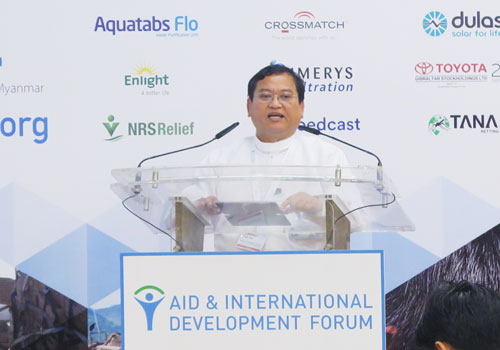Myanmar seeks better coordination in ODA
The government indicated a determination to better coordinate development assistance among sectors, ministries and projects, according to a senior official from the Ministry of Planning and Finance at the Aid & Development Asia Summit held in Nay Pyi Taw on June 14 and 15.
Businesses, NGOs, UN agencies, experts and government officials gathered at the capital for the Aid and International Development Forum (AIDF) during those two days and exchanged views on a range of topics.
The organiser noted that NGOs are increasingly active in Myanmar, working in humanitarian response and longer-term development in a multitude of sectors, including the environment, health, education, livelihoods, advocacy, and civil society capacity building. Consulting firm McKinsey forecasts that the economy could more than quadruple to reach $200 billion by 2030.
“As Planning and Finance Minister U Kyaw Win recently noted, Myanmar is at the cusp of development take-off – and yet we are a country which remains vulnerable to a variety of challenges.
“These challenges include climate change, the risk of continued conflict, a significant infrastructure deficit and the need to ensure that the development progress we achieve today does not come at the expense of generations to come,” said U Tun Tun Naing, permanent secretary of the Ministry of Planning and Finance, during the closing remark of the summit on June 14.
U Tun Tun Naing insisted that Myanmar has also experienced a huge increase in official development assistance (ODA) flows since the country’s reform process began in 2011. Between 2015 and 2016 alone, Myanmar registered a 90.7 percent growth in Country Programmable Aid, with continued increases expected until 2019 and beyond.
“In the past, development cooperation efforts with Myanmar were mostly limited to humanitarian assistance due to economic sanctions and political tensions. In such cases, financial resources were mostly channelled through international and local non-governmental organisations.
“However, in recent years, our partners have re-engaged whole-heartedly, and ODA commitments have increased steadily,” he said.
“In Myanmar, we also know that development assistance makes up just a small portion of the overall development finance envelope that will be available to us going forward. Moreover, with our new set of sector-level planning frameworks in place, the financial resources required to achieve our development vision will surely exceed that which has been available in previous decades.
“We also know that as we move forward with our national plans and program to address the Sustainable Development Goals, we will need to tap into other sources of finance and that the role of aid will be reduced, relative to other sources of finance,” he continued.
“It is therefore incumbent upon us to use our precious aid resources effectively, to channel these resources to where they are needed most, and to ensure these resources are used openly and transparently for the good of our people,” he added.
According to U Tun Tun Naing, the most significant initiative has been the creation of the Development Assistance Coordination Unit (DACU). Myanmar is committed to working with all partners in development to ensure that international assistance brings maximum benefits to the population.
“The establishment of the DACU is firmly in line with this commitment.
“The DACU meets at a working level on a weekly basis and to date has reviewed hundreds of cases, working quietly and efficiently to improve government management, coordination, oversight and ownership of this assistance,” he said.
The second major initiative is the creation of “Development Assistance Policy” which seeks to maximise the benefit of international assistance by ensuring this assistance is consistent with Myanmar’s priorities for development assistance, including alignment with ministry and sector plans and strategies.
“We are in the final stages of preparing a first draft and look forward to the opportunity to consult with our partners in the very near future,” he said.
The third key initiative is the formation of a new set of Sector Coordination Groups centred around 10 core sectors prioritised by the government.
“We recognise that while everybody supports greater coordination, not everybody wants to be c oordinated. That’s why we look forward to seeing these Sector Coordination Groups to begin convening in the coming weeks — ahead of our planned Development Effectiveness Roundtable — to ensure that coordination goes further than simple information sharing,” U Tun Tun Naing said.
The Sector Coordination Groups must form the fundamental core of government-led aid coordination structure and are counting on all stakeholders to make full use of these important groups.
U Tun Tun Naing said these are just some of the bold initiatives Myanmar has taken forward in recent months. The DACUs mandate includes greater engagement with civil society and the private sector.
“We are also taking steps toward addressing constraints to the implementation of development assistance.
“Furthermore, our membership of the International Aid Transparency Initiative [IATI], our engagement for the first time in the Global Partnership for Effective Development Cooperation [GPEDC] and the development of our own, home-grown open source Aid Information Management System [AIMS] are just some of the very technical but also fundamental initiatives which we have embarked upon, to ensure not a single Kyat is wasted,” he said.
Source: http://www.mmtimes.com/index.php/business/26468-myanmar-seeks-better-coordination-in-oda.html


 Thailand
Thailand




